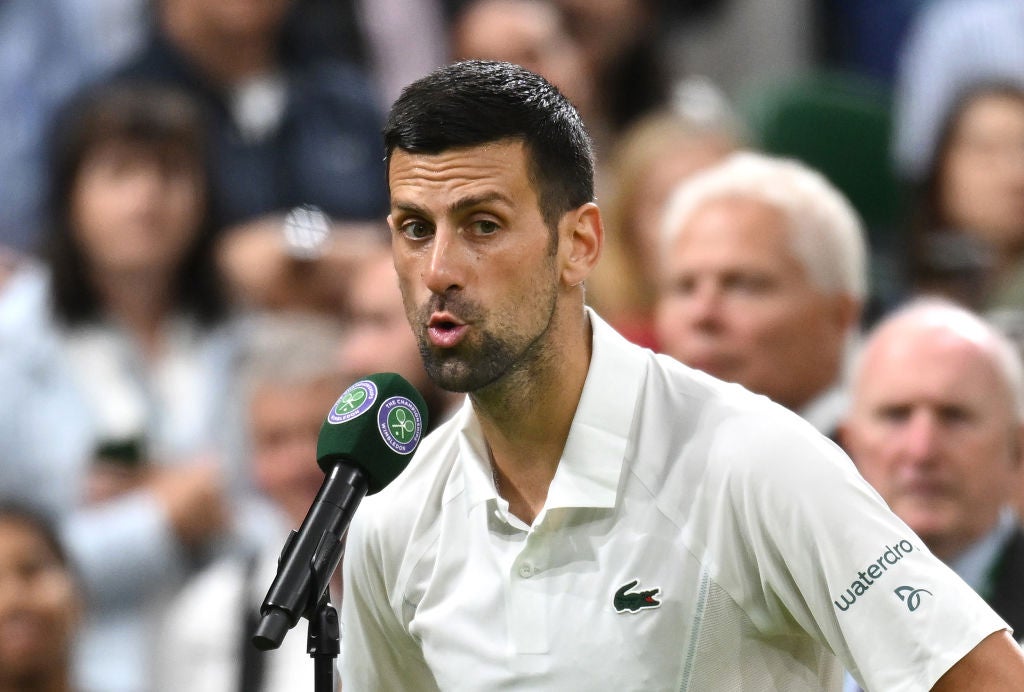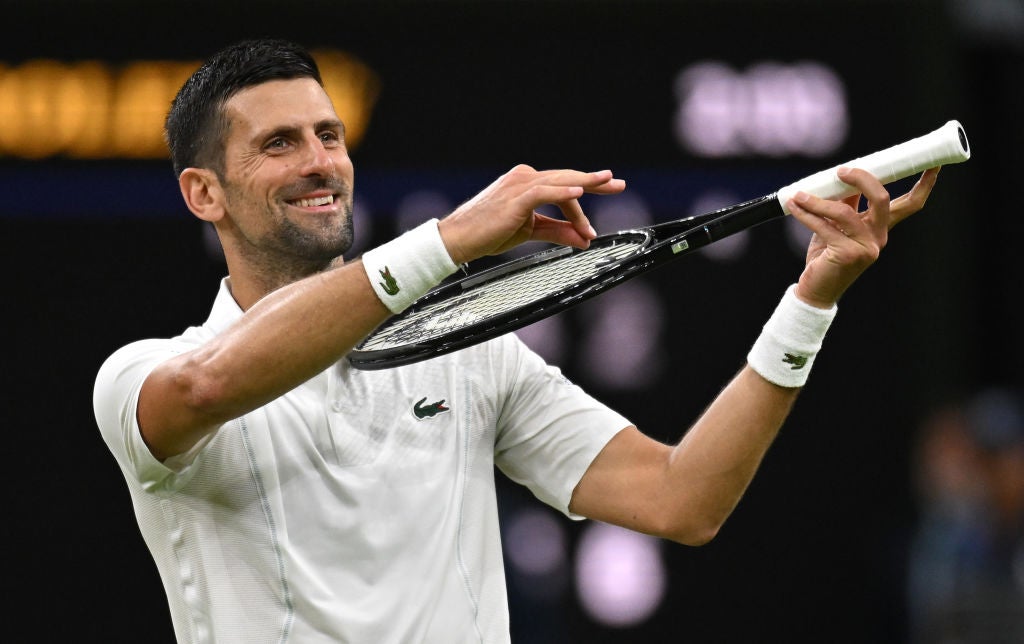In the aftermath of last year’s Wimbledon final, it was tempting to wonder if Novak Djokovic’s defeat to Carlos Alcaraz signalled the start of a change. Bidding for a fifth Wimbledon title in a row, Djokovic was beaten in an epic five-set battle in his first defeat at the Championships since 2017. As he contemplated the end of his dominance at the All England Club, Djokovic was gracious, his praise of the young Alcaraz glowing and genuine. After so many victories, it was a little startling to see such a fierce competitor embracing the rare taste of defeat like an old friend, reflecting an attitude of “win some, lose some” in front of the Centre Court crowd.
But rather than marking the shift towards a more mutually appreciative relationship, the opposite has occurred. On Monday night, as Djokovic sealed victory over Holger Rune in the fourth round, the seven-time champion turned on sections of the Wimbledon crowd for “showing disrespect” – Rune was showered with cries of “Ruuuuuuune!”, which sounded a lot like “Boooooooo!”.
Having played Rune several times previously, Djokovic would have been aware that such a reaction from the crowd towards the Dane was nothing new. Djokovic, though, chose to hear boos. They acted as fuel to increase his level and take a step closer to an eighth title.
Djokovic actively taking on the crowd, or at least the rowdiest sections of it, was a significant moment in his long Wimbledon story. “I played in much more hostile environments, trust me, you guys can’t touch me”, sounded like a challenge to those who cheer against him, and the SW19 crowd appeared to embrace it following a straight-sets win over Italian Lorenzo Musetti. This time, the boos were unmistakable.
Djokovic has been using every trick in the book to push himself, even when off the court he appears as relaxed as any time in his career. At Wimbledon, his matches are being watched by his eight-year-old son and six-year-old daughter. He is spending his days between matches playing with his kids on the practice courts and is celebrating wins by pretending to play the violin, following a promise to his daughter.

So at 37, and with a record 24 grand slam titles already in the bag, Djokovic’s action suggest he no longer cares that he does not receive the same love or adulation from everyone in the crowd as his former rivals Roger Federer and Rafael Nadal did for so long. Now at peace with his own achievements, the mask is off.
Or, at least, it will be until Sunday night as he seeks to match Federer’s Wimbledon record for most men’s singles titles at eight. Djokovic is hardly the first athlete to use outside noise and confrontation as a source of motivation. Michael Jordan famously conjured up trash talk from rival opponents in his head, as well as using any criticism of him to lead the Chicago Bulls to six NBA titles. The release of the ‘Last Dance’ documentary and the re-telling of Jordan’s mentality to win at all costs has influenced a new generation of stars across sport, as can be seen by how England and Jude Bellingham have repeatedly spoken about using perceived negativity around their displays at Euro 2024 as “fuel” in reaching the final, even when the team was objectively underperforming.
It is hardly surprising that Djokovic himself would develop such a siege mentality after arriving into the era of Federer and Nadal, perhaps the two most popular players of all time, and then surpassing both. In terms of grand slams, it took Djokovic 15 years to stand on his own at the top after winning the French Open in 2023 to reach 23 titles, with many of his greatest victories coming when he took on either Federer or Nadal and won against the crowd. It has now been two years since Nadal played Wimbledon, three since Federer bowed out from the Championships, yet it remains the case that while Djokovic will be cheered on by die-hard fans wherever he goes, there will be as many supporting his opponent. He can be a victim of his own success and the desire to see an upset.
For a while during his most dominant streak, Djokovic made attempts to win over crowds as he turned to all four sides of the court and celebrated with his post-match ‘love’ gesture, but it was always dismissed as performative and seen through as trying too hard. In his older years, especially now the grand slam record is his for life, Djokovic has been more genuine as he has repeatedly denied the attempts of the next generation, the level of tennis he produced even last year in winning three of the four grand slams impossible not to respect. Whether that ever transpires into ‘love’ doesn’t really seem to matter any more, either.

At 37, the reality that Djokovic’s opportunities to win more grand slam titles are running out has never been as clear as it was before this year’s Wimbledon. It was simply assumed that Djokovic was ruled out of the tournament when he withdrew from his French Open quarter-final last month and underwent surgery to repair a torn meniscus in his right knee. After reaching a 49th grand slam semi-final, he called his recovery from the operation to make the start line at Wimbledon as one of the greatest achievements of his career. Winning the title would be nothing short of extraordinary, particularly against Alcaraz in the final, with Daniil Medvedev, who played against ‘the big three’ and lost to the Spaniard in the semi-finals, describing him as his greatest-ever opponent.
If Djokovic is portrating a more relaxed persona off the court, then on the court, he remains as competitive and determined as ever. “The tension and the pressure and the stress is really high, as high as it always has been,” Djovkovic said this week. In doing so, he will gratefully accept more fuel for the fire within as he seeks to reclaim his throne.

